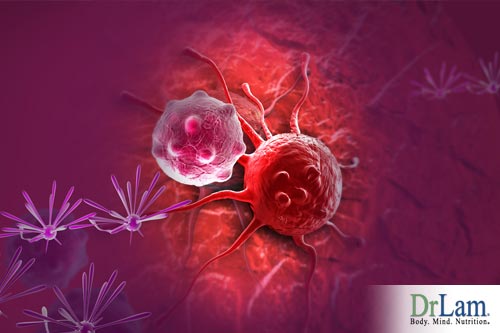 Systemic enzyme therapy has been shown to improve the enzymes that block cancer cells and inhibit their metastasis.
Systemic enzyme therapy has been shown to improve the enzymes that block cancer cells and inhibit their metastasis.
One of the primary causes of cancer is the accumulation of free radicals – highly reactive and unstable molecules – in the system. One of the best ways to fight free radicals is through the use of antioxidants such as vitamins A, C, E, bioflavonoids, carotenoids and specific minerals.
Antioxidant enzymes can also be useful, and they include superoxide dismutase, catalase and glutathione peroxidase.
Superoxide dismutase is an enzyme that contains a reactive form of oxygen that converts the free radical superoxide into hydrogen peroxide, with zinc and manganese acting as cofactors.
Though not as dangerous as superoxide, hydrogen peroxide also generates free radicals.
Catalase, which is deficient in cancer cells, is an enzyme that is vital to the disintegration of hydrogen peroxide by converting it to oxygen and water. Without catalase, hydrogen peroxide builds up to unhealthy levels.
Glutathione peroxidase converts reactive molecules like lipid peroxides into less reactive molecules, helping to clear them from the system.
Systemic enzyme therapy has been studied as a possible alternative cancer therapy for many years. In one study, patients with advanced pancreatic cancer showed much improvement when given proteolytic enzyme therapy.
Systemic enzyme therapy can help boost cytokines, whose actions help in the destruction of cancer cells.
Decreasing inflammation and breaking down fibrin can also aid in cancer treatment. Fibrin can cloak cancer cells and help them go undetected. However, with their breakdown by enzymes, the cancer cells are then exposed to the immune system. Since enzymes can boost the immune system, they increase these cancer fighting abilities as well.
One of the first things to consider is the bioavailability of oral enzyme formulas.
One issue that can cause problems for oral enzymes is the acidity of the stomach. Enzymes are sensitive to pH levels, and so the formula needs to have a good enteric coating. It seems that plant-based enzymes can withstand a larger pH range than animal-based enzymes. The broader the pH range the enzyme can handle, the better.
The reason this is important is that you want to get the enzymes all the way to the small intestine while they are still active in order for them to have good systemic therapeutic effect.
Another consideration is the quality of the systemic enzyme therapy formula you take. According to the Food Chemical Codex (FCC), the national standard for the evaluation of enzymes, enzymes should be measured in activity and not just milligrams.
It’s also really important that you get your enzyme supplements from high quality sources that contain a combination of different enzymes.
There are thousands of different kinds of enzymes, but there are some that have been tried and tested and that you can count on. Here is a list of some of the most popular:
 Bromelain comes from the pineapple fruit and stem. The fact that it is absorbed (unchanged) in animal experiments at a 40 percent rate is significant. Its benefits include having anti-inflammatory, antioxidant, anti-edema and anti-coagulation effects. In some animal studies, bromelain was shown to inhibit the growth of tumors and malignant cells. It also has skin debridement and fibrinolytic activity, and it inhibits platelet aggression.
Bromelain comes from the pineapple fruit and stem. The fact that it is absorbed (unchanged) in animal experiments at a 40 percent rate is significant. Its benefits include having anti-inflammatory, antioxidant, anti-edema and anti-coagulation effects. In some animal studies, bromelain was shown to inhibit the growth of tumors and malignant cells. It also has skin debridement and fibrinolytic activity, and it inhibits platelet aggression.
Though it is possible to get bromelain from fresh pineapple juice, the dosage you need may not be met by the quantities you drink. This is why it is useful to get it in supplement form.
Papain is a proteolytic enzyme that comes from the papaya fruit. Because it helps break down tough protein fiber in food, it is used as a digestive enzyme as well as a meat tenderizer.
This can be very useful if your digestive system is sluggish or if your AFS is affecting your digestion. Although you can get it by eating papaya, again, the benefits are dose-dependent and not many people would eat large quantities of papaya every day. Papaya fruit powder is a good option if you want to make sure you get enough papain, and some blends add bromelain for the extra benefits.
Pepsin is produced in the body and it helps with protein digestion as well as stimulating the liver and gallbladder to secrete bile into the small intestine, which helps with the digestion of fats. Pepsin also helps with the absorption of vitamin B12.
A good option here is the Betaine HCl formula, which not only contains pepsin but also contains betaine and hydrochloric acid. Betaine helps with healthy homocysteine levels, reducing heart disease and bone fracture risks. Hydrochloric acid helps with making vitamins more bioavailable and absorbable.
Pancreatin 10x enzyme blend is an all-round formula for digestion as it contains all three types of digestive enzymes needed: proteases for protein, lipases for fats and amylases for carbohydrates.
Be sure to choose a formula made from high-quality, naturally occurring enzymes.
Another good digestive aid is ox bile extract as it contains many of the digestive enzymes needed to break down food properly. It can also be useful if you suffer from nausea, diarrhea or upset stomach.
If you are considering taking enzymes for a specific condition, such as AFS or for a GI tract disorder, we highly recommend that you consult your doctor first. You need to have a professional make sure you are taking the right kind of supplement, in the right way (digestive or systemic), and with the right dosage.
You also need someone who can track your progress and make adjustments along the way.
 Some enzyme supplements that support adrenal fatigue can actually worsen inflammation along the way, while other supplements reduce inflammation. The shotgun approach of trying out many different supplements is strongly advised against as it can really backfire in the long run.
Some enzyme supplements that support adrenal fatigue can actually worsen inflammation along the way, while other supplements reduce inflammation. The shotgun approach of trying out many different supplements is strongly advised against as it can really backfire in the long run.
Also, the kind of enzymes that would benefit you really depends on what condition you have and your current state of health, your diet, and your age and gender.
Although the theory that enzymes decrease as we age still holds true, there is some new research that shows that there are nuances. For example, the enzyme amylin does decrease during middle age, but it starts to increase again afterwards. This could be an explanation for aging-related anorexia and the delay in gastric emptying.
Another study showed that men’s enzyme activity has a slight decrease as they age, and women’s lipase enzyme activity drops by a considerable amount.
As you can see, navigating the enzyme-supplement terrain can be a bit tricky, and thinking about doing systemic enzyme therapy without the right guidance can feel overwhelming. It is best to start off on the right foot by getting experts on your side.
Because everybody is different, nutritional coaching could also be a good way to make sure your diet is rich in enzymes while also being suitable for your condition.
© Copyright 2017 Michael Lam, M.D. All Rights Reserved.
